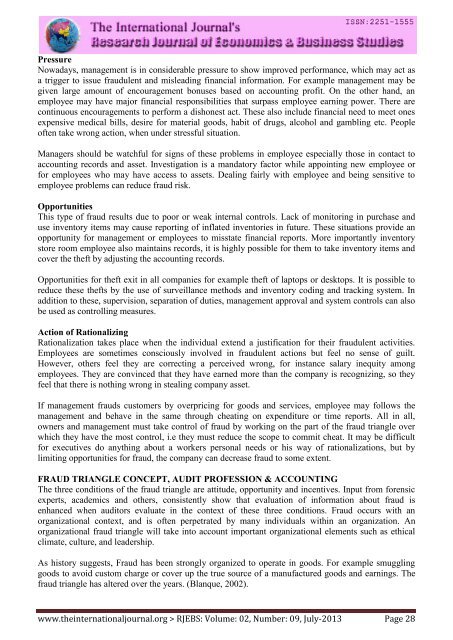Research Journal of Economics & Business Studies - RJEBS - The ...
Research Journal of Economics & Business Studies - RJEBS - The ...
Research Journal of Economics & Business Studies - RJEBS - The ...
Create successful ePaper yourself
Turn your PDF publications into a flip-book with our unique Google optimized e-Paper software.
Pressure<br />
Nowadays, management is in considerable pressure to show improved performance, which may act as<br />
a trigger to issue fraudulent and misleading financial information. For example management may be<br />
given large amount <strong>of</strong> encouragement bonuses based on accounting pr<strong>of</strong>it. On the other hand, an<br />
employee may have major financial responsibilities that surpass employee earning power. <strong>The</strong>re are<br />
continuous encouragements to perform a dishonest act. <strong>The</strong>se also include financial need to meet ones<br />
expensive medical bills, desire for material goods, habit <strong>of</strong> drugs, alcohol and gambling etc. People<br />
<strong>of</strong>ten take wrong action, when under stressful situation.<br />
Managers should be watchful for signs <strong>of</strong> these problems in employee especially those in contact to<br />
accounting records and asset. Investigation is a mandatory factor while appointing new employee or<br />
for employees who may have access to assets. Dealing fairly with employee and being sensitive to<br />
employee problems can reduce fraud risk.<br />
Opportunities<br />
This type <strong>of</strong> fraud results due to poor or weak internal controls. Lack <strong>of</strong> monitoring in purchase and<br />
use inventory items may cause reporting <strong>of</strong> inflated inventories in future. <strong>The</strong>se situations provide an<br />
opportunity for management or employees to misstate financial reports. More importantly inventory<br />
store room employee also maintains records, it is highly possible for them to take inventory items and<br />
cover the theft by adjusting the accounting records.<br />
Opportunities for theft exit in all companies for example theft <strong>of</strong> laptops or desktops. It is possible to<br />
reduce these thefts by the use <strong>of</strong> surveillance methods and inventory coding and tracking system. In<br />
addition to these, supervision, separation <strong>of</strong> duties, management approval and system controls can also<br />
be used as controlling measures.<br />
Action <strong>of</strong> Rationalizing<br />
Rationalization takes place when the individual extend a justification for their fraudulent activities.<br />
Employees are sometimes consciously involved in fraudulent actions but feel no sense <strong>of</strong> guilt.<br />
However, others feel they are correcting a perceived wrong, for instance salary inequity among<br />
employees. <strong>The</strong>y are convinced that they have earned more than the company is recognizing, so they<br />
feel that there is nothing wrong in stealing company asset.<br />
If management frauds customers by overpricing for goods and services, employee may follows the<br />
management and behave in the same through cheating on expenditure or time reports. All in all,<br />
owners and management must take control <strong>of</strong> fraud by working on the part <strong>of</strong> the fraud triangle over<br />
which they have the most control, i.e they must reduce the scope to commit cheat. It may be difficult<br />
for executives do anything about a workers personal needs or his way <strong>of</strong> rationalizations, but by<br />
limiting opportunities for fraud, the company can decrease fraud to some extent.<br />
FRAUD TRIANGLE CONCEPT, AUDIT PROFESSION & ACCOUNTING<br />
<strong>The</strong> three conditions <strong>of</strong> the fraud triangle are attitude, opportunity and incentives. Input from forensic<br />
experts, academics and others, consistently show that evaluation <strong>of</strong> information about fraud is<br />
enhanced when auditors evaluate in the context <strong>of</strong> these three conditions. Fraud occurs with an<br />
organizational context, and is <strong>of</strong>ten perpetrated by many individuals within an organization. An<br />
organizational fraud triangle will take into account important organizational elements such as ethical<br />
climate, culture, and leadership.<br />
As history suggests, Fraud has been strongly organized to operate in goods. For example smuggling<br />
goods to avoid custom charge or cover up the true source <strong>of</strong> a manufactured goods and earnings. <strong>The</strong><br />
fraud triangle has altered over the years. (Blanque, 2002).<br />
www.theinternationaljournal.org > <strong>RJEBS</strong>: Volume: 02, Number: 09, July-2013 Page 28
















